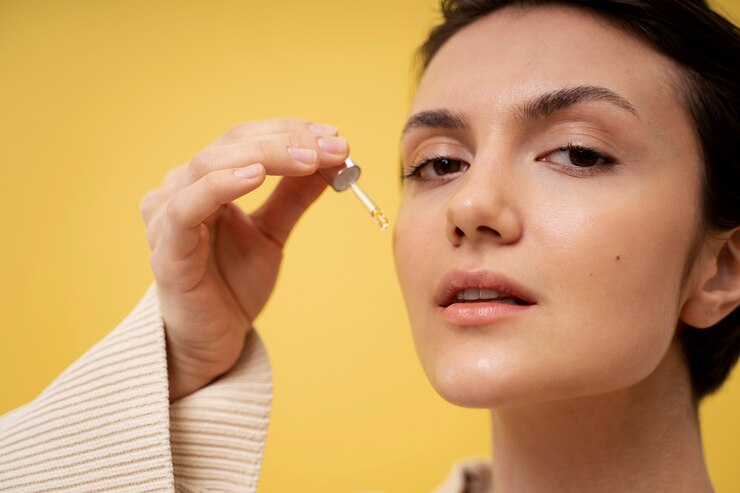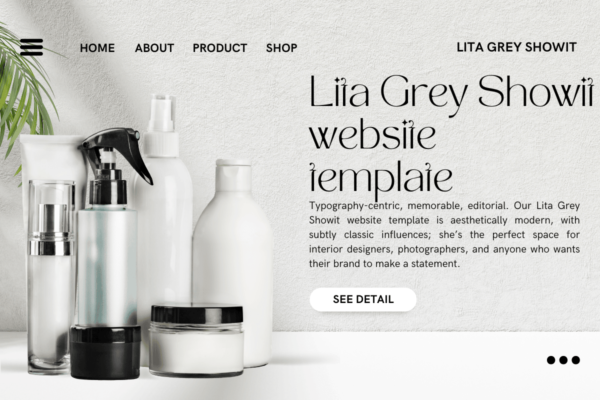Vitamin C serum has taken the skincare world by storm, and for a good reason! If you’ve been wondering what the hype is about or how to incorporate Vitamin C into your skin care routine, you’re in the right place. In this guide, we’ll break down everything you need to know about Vitamin C serums, from their benefits to how to choose the best one for your skin.
What is Vitamin C Serum?

Definition and Ingredients
Vitamin C serum is a skincare product infused with Vitamin C, a potent antioxidant known for its skin-brightening and anti-aging properties. Typically, these serums are water- or oil-based and are designed to deliver a concentrated amount of Vitamin C directly to the skin.
Different Forms of Vitamin C in Skincare
Vitamin C comes in various forms in skincare products. L-Ascorbic Acid is the most common and potent, but other derivatives like Sodium Ascorbyl Phosphate and Magnesium Ascorbyl Phosphate are often used for stability and gentleness on the skin.
The Science Behind Vitamin C Serum

How Vitamin C Works for Skin Health
Vitamin C is vital for skin health due to its antioxidant properties. It helps neutralize free radicals—unstable molecules that can damage your skin’s cells, accelerating aging and causing inflammation.
Scientific Studies Supporting its Benefits
Numerous studies back the benefits of Vitamin C in skincare. Research shows that Vitamin C can reduce signs of aging, help with pigmentation issues, and boost collagen production, leading to firmer, brighter skin.
Top Benefits of Using Vitamin C Serum
Brightening Dull Skin

One of the most celebrated benefits of Vitamin C serum is its ability to brighten dull skin, giving you that coveted glowing complexion.
Reducing Fine Lines and Wrinkles

Vitamin C is renowned for its anti-aging effects. By stimulating collagen production, it helps reduce the appearance of fine lines and wrinkles.
Fighting Hyperpigmentation

If you struggle with dark spots or uneven skin tone, Vitamin C serum can help by inhibiting melanin production, making it a great tool for fighting hyperpigmentation.
Boosting Collagen Production

Collagen is essential for maintaining skin elasticity. Vitamin C enhances the skin’s natural collagen production, keeping your skin looking youthful and firm.
Antioxidant Properties

As a powerful antioxidant, Vitamin C protects your skin from oxidative stress, which is caused by environmental factors like UV exposure and pollution.
How to Choose the Best Vitamin C Serum
Concentration and Potency
When choosing a Vitamin C serum, you’ll notice varying concentrations, typically ranging from 10% to 20%. Beginners should start with lower concentrations to avoid irritation.
Additional Ingredients to Look For
Some serums include additional ingredients like Vitamin E, Ferulic Acid, or Hyaluronic Acid, which can enhance the effectiveness of Vitamin C and provide extra hydration.
Packaging Considerations
Vitamin C is highly sensitive to light and air, so opt for products in dark, opaque bottles with airtight seals to prevent degradation.
Suitable Skin Types
While Vitamin C serum works for most skin types, those with sensitive skin should look for milder derivatives like Sodium Ascorbyl Phosphate or lower concentrations to avoid irritation.
How to Use Vitamin C Serum Effectively
When and How Often to Apply
Vitamin C serum is best applied in the morning after cleansing but before moisturizing. It can be used daily, depending on your skin’s tolerance.
Layering Vitamin C with Other Skincare Products
You can safely layer Vitamin C with most skincare ingredients, but avoid using it at the same time as retinol, as it can cause irritation. Pairing it with a broad-spectrum sunscreen enhances its protective benefits.
Common Mistakes to Avoid
Avoid using too much serum, as it can lead to irritation or breakouts. Also, be mindful of mixing Vitamin C with highly active ingredients like AHA/BHAs, which could increase skin sensitivity.
Side Effects and Precautions
Potential Skin Reactions
Some people may experience redness, itching, or stinging, especially if using a higher concentration. Always patch-test before full application.
Who Should Avoid Vitamin C Serums?
People with highly sensitive skin or certain skin conditions like rosacea should consult a dermatologist before using Vitamin C serums to prevent potential irritation.
Vitamin C Serum vs. Other Serums: Which is Right for You?
Comparing with Hyaluronic Acid, Retinol, and Niacinamide Serums
Vitamin C is excellent for brightening and anti-aging, but you might prefer Hyaluronic Acid for hydration or Retinol for deeper anti-aging effects. Niacinamide is another great option for reducing inflammation and controlling oil production.
DIY vs. Store-Bought Vitamin C Serum
Is DIY Safe?
While DIY Vitamin C serums are possible, they can be tricky. Homemade versions might not be as stable or effective as store-bought options and could irritate the skin if not formulated correctly.
Pros and Cons of DIY vs. Commercial Products
DIY serums are cheaper, but they lack the stability and potency of professional formulas. Store-bought versions are more reliable in terms of efficacy and safety.
Popular Myths About Vitamin C Serum
Myth #1: All Vitamin C Serums are the Same
Not true! The type of Vitamin C, concentration, and formulation all affect the serum’s performance.
2: Higher Concentration is Always Better
More isn’t always better. Higher concentrations can be more irritating, especially for sensitive skin.
3: Vitamin C Serum Causes Sun Sensitivity
Contrary to popular belief, Vitamin C doesn’t make your skin more sensitive to the sun. In fact, it enhances the efficacy of sunscreen.
How Long Does it Take to See Results with Vitamin C Serum?
Patience is key! You may start seeing brighter skin within a few weeks, but it can take 8 to 12 weeks to notice significant changes in fine lines and pigmentation.
Best Practices for Storing Vitamin C Serum
Keep your Vitamin C serum in a cool, dark place, away from sunlight, to extend its shelf life. Some people even store it in the fridge to maintain its potency.
Vitamin C Serums FAQs
Can I Use Vitamin C Serums Every Day?
Yes, you can use it daily, but if you have sensitive skin, you might want to start with a few times per week and gradually increase.
What Should I Avoid When Using Vitamin C Serums?
Avoid using Vitamin C with exfoliants like AHA/BHAs in the same routine, as this can cause irritation.
Can I Use Vitamin C Serums at Night?
While it’s most effective in the morning, Vitamin C serums can also be used at night.
Can I Use Vitamin C Serums with Retinol?
It’s best to use Vitamin C in the morning and Retinol at night to avoid irritation.
How Long Does Vitamin C Serums Last After Opening?
Once opened, a Vitamin C serums typically lasts about 3 to 6 months, depending on the packaging and formulation.














